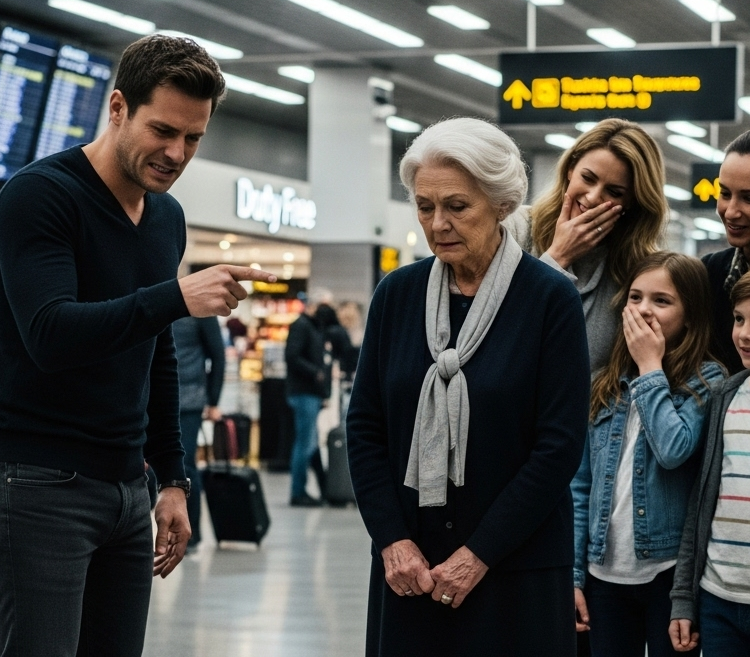My name is Martha Green, and at 74 years old, I find myself reflecting on an experience that reshaped my relationship with my son. A worn leather suitcase, over forty years old, unexpectedly became the centerpiece of a lesson in humility my son, David, needed far earlier than he received it.
David had invited me on a family trip abroad with him, his wife Caroline, and their children. Although I hesitated, content with the peaceful rhythm of my everyday life, he insisted, reminding me that his children barely knew their grandmother and this journey would bridge that gap.
So I packed my belongings: simple clothes, a cherished shawl gifted by my late husband Walter, and my faithful leather suitcase that had accompanied us since our honeymoon. Its edges were worn smooth, brass clasps dulled by time, each mark a silent chronicle of years gone by. This suitcase was more than a travel companion—it was a vessel of memories no modern case could match.
- David saw only an embarrassment.
- At the airport, his disdain was blatant and loud.
- Strangers glanced our way, some amused, others pitying.
- His wife and children joined in mocking the suitcase.
His verbal jabs pierced deeper than I expected. His laughter, shared with Caroline and the children, transformed the public space into a stage for my humiliation. For years, subtle indignities had marked our interactions—eye rolls at my clothes, sidelined celebrations, and ignored birthdays. But the airport’s harsh fluorescent lighting made it all painfully visible.
“It’s just a suitcase, David,” I murmured, attempting to quell the sting.
“No, Mom. It’s embarrassing – you’re embarrassing,” he shot back. “Why not get a normal bag?” Caroline added with a sharp laugh, suggesting a new purchase might prevent onlookers from assuming I had arrived from a bus station.
Despite the burning in my cheeks, I held back tears, gripping the familiar handle as we moved toward check-in.
“Dignity isn’t about what others say to you. It’s about how you carry yourself when they say it.” – Walter’s words echoed within me.
The check-in line stretched ahead, filled with families pushing sleek suitcases gliding easily across the floor. Mine creaked softly beneath my grip, drawing remarks from David and chuckles from Caroline and the children who mockingly dubbed it “the dinosaur bag.” Their laughter hollowed me out. I longed to tell them this bag had carried David’s first baby clothes but held back, choosing instead to remember Walter’s advice and stand tall.
When my turn came, the airline attendant offered a gentle smile, tinged with pity. David’s dismissive attitude seemed to lessen the attendant’s warmth. However, she soon asked me to step aside and wait with a staff member privately, sparking curiosity and confusion in my son.
Moments later, two uniformed officers approached us, parting the crowd with authority. Polite and composed, they requested a private conversation with me, excluding David. The shift in his demeanor—from arrogance to uncertainty—was palpable.
Inside a quiet lounge, a woman in a tailored suit greeted me warmly. “Mrs. Green, your late husband’s service with our airline is still honored. He dedicated nearly thirty years to us. In recognition, we have upgraded your ticket to first class.”
My breath caught. Walter’s legacy quietly endured. A youthful attendant respectfully handled my beloved suitcase, praising its character and craftsmanship as something rare today.
In my plush seat, sipping champagne and running my hand over the aged leather, I whispered a soft thank you to Walter—feeling his presence protect and dignify me despite previous disrespect.
- I was seated ahead of boarding passengers.
- David and his family shuffled past, stunned.
- Their mocking expressions faded into disbelief.
David’s shock turned pale as he passed me, now the honored guest while he settled into economy. Caroline’s whispered complaint about the embarrassment now felt reversed. For the first time in years, the shame no longer resided with me but settled heavily on David’s shoulders.
The remainder of the trip carried a subtle, tense atmosphere. The jokes and barbs ceased. David spoke cautiously, as if recalibrating his view of me. Observing the respect I received disrupted his prior assumptions and humbled him.
Back home, the vintage suitcase remains a testament—not only to Walter’s memory but to the respect no one can strip from a person who holds it firmly. I have since embraced a fuller life, traveling alone, reconnecting with friends, and pursuing new passions previously overshadowed by unmet approval.
Key Insight: The most enduring treasures are not the flashy or the new, but those that carry love, memory, and resilience through time.
David’s attitude has shifted, now reaching out with care, arranging visits on my terms, and offering a genuine apology—small but meaningful. My grandchildren cherish the stories woven around Walter and the suitcase that holds so much history. What was once a source of embarrassment has become a bridge across generations.
Many believe clinging to the past signals weakness. Yet, sometimes the weight we carry anchors us in identity and love. The worn leather bag, dismissed by my son, stood as a symbol of enduring strength. Ultimately, the one who lost sight of lasting values was not I, but the son who momentarily forgot that true worth withstands the test of time.
Through this experience, I have learned that dignity is self-defined and cannot be diminished by others’ opinions. The journey with my suitcase is a reminder: respect is earned through grace, carried in the heart, and recognized in moments unexpected.
In embracing my past with pride, I’ve found peace and renewed connection with family, no longer waiting for validation but living fully on my own terms.
